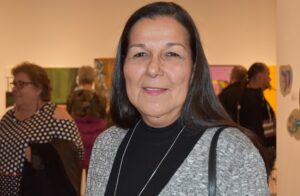Indigenous Housing Strategy joins forces with local partners to combat homelessness in North Bay

By Kelly Anne Smith
NORTH BAY— North Bay’s Indigenous Housing Strategy has joined forces to battle homelessness.
With 42% of the people who are homeless in North Bay being Indigenous, the executive director of the North Bay Indigenous Friendship Centre (NBIFC) needs proportional dollars to flow for NBIFC housing navigators to continue to be successful helping people find homes.
Kathy Fortin is teaming with North Bay Indigenous Hub and The Native People of Nipissing Housing Corporation to help people who are homeless.
Fortin wants the city to be transparent so they acknowledge proportional funding is needed to offer cultural, trauma-informed services.
Fortin says the NBIFC has not received any funds through the District of Nipissing Social Services Administration Board (DSSAB).
“The only funds that we’ve received recently is from hosting the Warming Centre on the weekends. That’s a service provided for the city.”
North Bay City Councillor Mark King, the chair of the DSSAB, has reached out to the NBIFC. King proposes he and the CAO of DSSAB meet with Fortin and NBIFC President Katherine Sarazin.
“We’ve given them an option to come to our board and make a presentation directly to the board so that the board understands what the issue is.”
Fortin wants accountability.
“There is funding there for Indigenous people, though they don’t explain exactly how the funding is being used.”
Meanwhile, King calls on the federal government to provide more supports for Indigenous members moving from reserves into cities.
“The municipality or the province ends up shouldering the problem. I don’t feel that right now that anything is being done. No one is really trying to address the issue.”
Fortin says Indigenous agencies like the NBIFC have the expertise to help Indigenous people.
“I don’t think the city understands the uniqueness of Indigenous people. Many people who come from up north or wherever, they are not used to the city,” she explains. “They are missing that point that there is a uniqueness. That’s where they are failing— trying to figure out why they can’t house these people. It’s because they don’t really know who these people are.”
Fortin says what really needs to happen is Indigenous advocacy with cultural sensitivity and cultural awareness.
“As the North Bay Indigenous Friendship Centre, we’d be the advocate for Indigenous people in North Bay. Along with the (North Bay) Indigenous Hub and The Native People of Nipissing (Housing Corporation),” she adds. “Right now, we have two Suswin Homeless Navigators through the Ontario Trillium Foundation. We have a little bit more funding to hold on to the positions until the end of April.”
“They are the ones that navigate the Indigenous People through the city. They advocate with landlords and social services,” she continues. “Some of them come here for education. A lot of them come here for medical reasons. Some don’t even know how to talk to a landlord… We provide services such as having them sit in a workshop so they learn what to do to live in an apartment with budgeting.”
Fortin has worked at the Friendship Centre on the weekends offering a warming centre out of the cold.
“Councillors really need to see exactly what’s happening on the ground and what these people need.”
Fortin also calls on the province to request better data collection during service provision for Indigenous people.
“Having the stats and what needs are being covered of a certain group of people is so important.”
14% of the general population in the city are Indigenous. The NBIFC is ready to provide immediate action for those without homes. 42% of them are Indigenous. Fortin says that supports need to be in place for people to live with dignity.
“People need someone to advocate for them. Sometimes, it’s hard for people to ask. A lot of the times, we ask them what they need such as, ‘Are you behind in your rent?’ Entering the big tall building at City Hall is scary for someone to go in there and ask for help,” she explains. “When our Indigenous people come from up the coast, they can come from everywhere; they have never seen anything like that before. They’ve got the band office where they know everybody. All of a sudden, they have to walk into these institutionalized buildings. It’s scary.”
Fortin says the winter and the coronavirus disease 2019 (COVID-19) pandemic has made it a doubly hard time for those without a home. She holds out for hope come the spring; digging starts for the new Suswin building with 30 units of transitional housing to be built across the street from the NBIFC. Fortin wants the support of the municipality, and stable funding for crucial housing navigators.
“It’s not going to be the type of place for a bed and that’s it. It’s going to actually be program related. In order for them to stay there, they would have to complete whatever the intake is. Say they want to get employment and training or if they need their Grade 12, we are there to try to help them. When they do leave there, they have something in hand,” Fortin notes. “Suswin will be a partial solution to what is going on out there… Streamlining funding to the Indigenous Friendship Centre will have the funds used appropriately. There will be accountability as to where the Indigenous funding is going.”


